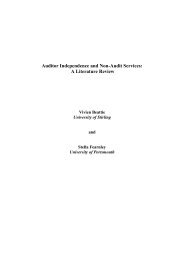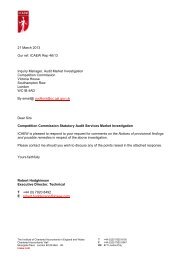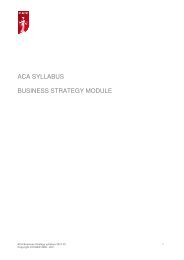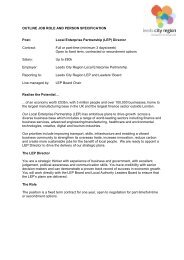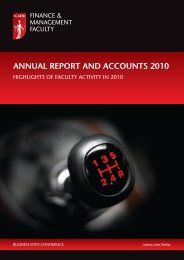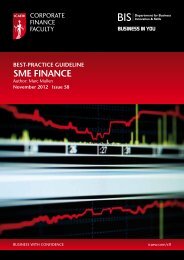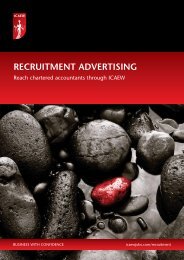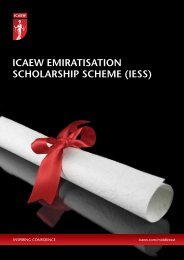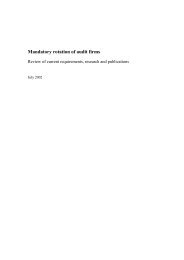Acting in the public interest â a framework for analysis - ICAEW
Acting in the public interest â a framework for analysis - ICAEW
Acting in the public interest â a framework for analysis - ICAEW
- No tags were found...
Create successful ePaper yourself
Turn your PDF publications into a flip-book with our unique Google optimized e-Paper software.
• giv<strong>in</strong>g up where targets seem unatta<strong>in</strong>able; 212• unconscious bias towards what suits us; 213• over commitment to prior decisions to avoid acknowledg<strong>in</strong>g error; 214• satisfic<strong>in</strong>g ra<strong>the</strong>r than optimis<strong>in</strong>g, as heuristic ‘mental shortcut’ behaviour applies priorexperience and first impressions through rules of thumb; 215 216 and• becom<strong>in</strong>g suspicious where <strong>the</strong>re is <strong>in</strong><strong>for</strong>mation asymmetry. 217It follows from <strong>the</strong> last po<strong>in</strong>t above that <strong>the</strong> perceived trustworth<strong>in</strong>ess of those responsible <strong>for</strong> a<strong>public</strong> <strong>in</strong>terest action will directly affect reaction to it. For example, <strong>the</strong> widespread belief <strong>in</strong> <strong>the</strong>UK that roadside speed cameras are revenue-generat<strong>in</strong>g devices ra<strong>the</strong>r than to enhance safetydiscourages will<strong>in</strong>g compliance.H<strong>in</strong>dsight research <strong>in</strong>to <strong>the</strong> causes of erroneous decisions suggests that we are <strong>in</strong>fluenced bypast experiences, prejudgements and attachments that can lead us to mislead<strong>in</strong>g conclusionsabout current situations. 218It is important <strong>for</strong> those responsible <strong>for</strong> implement<strong>in</strong>g <strong>public</strong> <strong>in</strong>terest measures to work on <strong>the</strong>assumption that people will react based on human nature as it is, ra<strong>the</strong>r than as it ‘should be’.Earlier thought leadership work by <strong>ICAEW</strong> analyses <strong>the</strong> record of <strong>the</strong> UK government’s childand work<strong>in</strong>g tax credit system, <strong>in</strong>troduced <strong>in</strong> 2003. 219 It resulted <strong>in</strong> massive over- and underpaymentsand several <strong>in</strong>vestigations were carried out. The problems were at least partiallyattributed to lack of <strong>in</strong><strong>for</strong>mation, and over-complexity, which put people off claim<strong>in</strong>g, orresulted <strong>in</strong> <strong>in</strong>correct claims. This seems to be a clear example of someth<strong>in</strong>g done on <strong>the</strong> basisof how it was thought people ‘ought’ to behave, ra<strong>the</strong>r than how <strong>the</strong>y actually do.9.1.3 PresumptionThen <strong>the</strong>re is <strong>the</strong> issue of whe<strong>the</strong>r people should be treated as <strong>in</strong>nocent until proven guiltyor vice versa: should any system of government assume ‘all people are knaves’? 220We started this report observ<strong>in</strong>g that <strong>in</strong> most societies, <strong>the</strong>re is a basic presumption thatpeople should be able to go about <strong>the</strong>ir legitimate bus<strong>in</strong>ess. Sometimes ‘legitimate’ isunclear – <strong>for</strong> example where what is legal and <strong>the</strong> greyer area of what is ‘just’ do not overlap.Never<strong>the</strong>less, an assumption of guilt unless <strong>in</strong>nocence is proven does not sit easily with this.There is also a risk that a presumption of guilt will result <strong>in</strong> sub-optimal regulation: such apresumption is likely to result <strong>in</strong> an economically worse outcome than that of a system basedon a different presumption, unless <strong>the</strong>re is reason to suppose that most of those regulatedactually are likely to misbehave. 2219.1.4 The approach to implementationThe approach <strong>for</strong> <strong>the</strong> implementer to use will take <strong>the</strong> above factors <strong>in</strong>to account but willalso depend on <strong>the</strong> degree of constra<strong>in</strong>t <strong>in</strong>tended and <strong>the</strong> extent to which it is expectedthat <strong>the</strong>re is already a propensity <strong>for</strong> people to do what is wanted of <strong>the</strong>m:• Deviation from <strong>the</strong> normCompulsion through law, regulation and en<strong>for</strong>cement creates <strong>the</strong> maximum amountof constra<strong>in</strong>t <strong>in</strong> terms of comply<strong>in</strong>g with what is required (at least <strong>in</strong> <strong>the</strong> short term).An <strong>in</strong><strong>for</strong>mation approach achieves <strong>the</strong> least constra<strong>in</strong>t and <strong>in</strong>centives come somewhere<strong>in</strong> between.• Alignment of requirement with self-<strong>in</strong>terestIncentives can be used to promote behaviour through self-<strong>in</strong>terest, but law or regulationis likely to be more effective where <strong>the</strong> desire is to change behaviour <strong>in</strong> a manner thatwould o<strong>the</strong>rwise be resisted. Where <strong>the</strong>re is already a self-<strong>in</strong>terest <strong>in</strong> do<strong>in</strong>g what is wantedor it is likely that <strong>in</strong>built values will cause <strong>the</strong> required behaviour, <strong>in</strong><strong>for</strong>mation is likely tobe more effective.212Ciulla, ‘Ethics and Leadership Effectiveness’.213Bazerman quoted <strong>in</strong> Marnet, ‘History Repeats Itself: The Failure of Rational Choice Models <strong>in</strong> Corporate Governance’.214Marnet, ibid.215Marnet, ibid.216Kay, The Truth About Markets.217Kay, ibid.218F<strong>in</strong>kelste<strong>in</strong>, Whitehead and Campbell, ‘Th<strong>in</strong>k Aga<strong>in</strong>: Why Good Leaders Make Bad Decisions and How to Keep it from Happen<strong>in</strong>gto You’.219<strong>ICAEW</strong>, In<strong>for</strong>mation <strong>for</strong> Markets and Society.220Hume, referred to <strong>in</strong> Engelen, ‘Th<strong>in</strong>k<strong>in</strong>g Th<strong>in</strong>gs Through: The Value and Limitations of James Buchanan’s Public Choice Theory’.221Engelen, ibid.Implementation63



